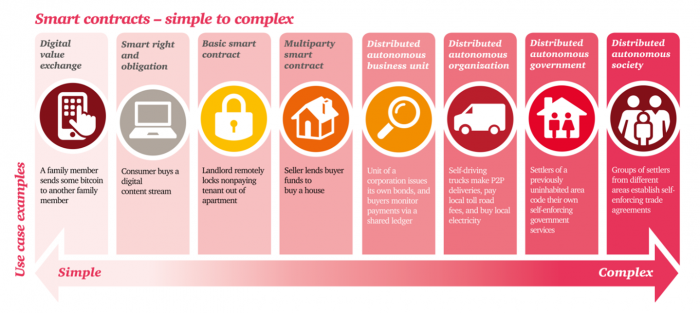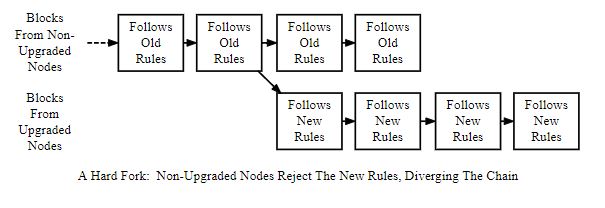By Dylan Davis
I had the fortune to attend the 2018 International Law Weekend as a Harris Institute student ambassador. Curious to learn how new, popular technologies might alter international commercial transactions, I took a special interest in the panel, “Smart Contracts and Blockchain: Where Will Disputes Arise and How Should They Be Resolved.”
The panel explored the advantages and disadvantages of these technologies, especially with respect to their relationship to international law. Daniel Reich (Shearman & Sterling) moderated a panel discussion with: Aaron Wright (Cardozo School of Law), Rebecca Bratspies (City University of New York – School of Law), Robert A. Schwinger (Norton Rose Fulbright), and David Earnest (Shearman & Sterling).
Smart Contracts and Blockchain
Blockchain is a technology that uses a decentralized digital ledger to catalogue past transactions. It has the advantage of being practically immutable, making the technology’s record-keeping extremely secure. After information has been added to the “chain,” it cannot be erased, and the information is available to all users, which provides the technology with the additional advantage of transparency.
This feature of Blockchain may have an enormous impact on the state of commercial transactions for the manner in which it eliminates the need for both intermediaries and trust. In particular, the technology is viewed as incredibly productive when coupled with Smart Contracts. A Smart Contract is similar to a traditional contract, except it is self-executing. Upon the completion of some condition, the bargained-for benefit is provided. A simple illustration of this is a vending machine, which completes a transaction automatically and eliminates the need for an intermediary. Smart Contracts are commonly computer programs, though, and can therefore integrate the Blockchain into their operations. When a Smart Contract uses the Blockchain, it will be able to reference a secure, transparent catalogue when executing some transaction. Aaron Wright provided an example of a program that would allow a business to set up an agreement with an employee and develop a form of auto-payment; using the Blockchain, both the terms of the agreement and its execution can be displayed in a secure, open manner. Smart Contracts are heralded for their efficiency and ability to reduce the need of intermediaries, such as lawyers, financial institutions, or others. In fact, Mr. Wright speculated that one obstacle to the widespread use of Smart Contracts might come from Civil Law countries, where notaries might be resistant to the technology fulfilling certain of their functions.

© PwC
Problems with Smart Contracts and Blockchain
Rebecca Bratspies offered a voice of skepticism on the drastic advantages of Blockchain technology. While endorsing the technology, she noted that we have to take a more restrained, critical view. She emphasized three ways that the technology has already given us trouble. First, she noted that on Ethereum each transaction has an execution fee, called “gas.” The issue is that the “gas” costs are not determined at the initiation of the transaction, but after it has been processed. This gap allows for fluctuations in cost, although “gas” costs are miniscule– far less than a cent. Nonetheless, an issue can still hypothetically arise if a contract doesn’t self-execute because the “gas” prices exceeded a user’s balance in the interim.
Second, Ms. Bratspies looked at a failure of the Decentralized Autonomous Organization (DAO). The DAO was an investment fund which operated on the Ethereum-Blockchain. The DAO itself had faulty code, which led to exploits that enabled individuals to steal millions of dollars. Although the human error in coding didn’t come from the Blockchain itself, it exposed the vulnerability of the secondary structures to minor errors in coding.
Finally, Ms. Bratspies also identified potential issues with hard forks to blockchain technology. A hard fork is basically a systematic overhaul to the code underlying some Blockchain technology. As a result, it modifies the Blockchain catalogue, creating a new one under slightly different rules. The previous system will still exist, though, hence the term “fork.” She identifies that there might be legal issues if a dispute arises between parties and one is reliant upon a different system.

Hard Fork Illustration, © Investopedia, LLC.
Smart Contracts and International Arbitration
Robert A. Schwinger offered a counterpoint to the tech-heavy discussion by introducing some speculation on how the law might receive Smart Contracts. He first noted that the law with respect to Smart Contracts is in its infancy and that there is a lot of room for the creation of new law. He analogized the execution of Smart Contracts to a traditional auction: for an auction, we know exactly where different legal responsibilities lie. For example, we know that we wouldn’t normally sue an auctioneer for fraud, but rather the party that made the inaccurate representation. Under Ethereum, though, the institutional structure isn’t as straightforward and implicates many more third parties. Questions of liability are much more indeterminate.
Mr. Schwinger offered some reflection on how judges might receive Smart Contracts. He claimed that use of the technology is disadvantageous insofar as it will frequently present an arbitrator with a question of first impression, making them less predictable. Nevertheless, he offers that use of international arbitration is better than that of the judiciary, because the former can be selected for their increased expertise or time commitment to a new subject.
Certain other questions were left unresolved – for example, the panelists wondered whether there could ever be a court order for a hard fork. If so, how could such an order be administered? The panelists also noted that Smart Contracts can still leave room for subjective interpretation, and that Smart Contracts don’t always resolve the question of whether the parties performed properly. In such cases, it was acknowledged for now that recourse is still necessary to the traditional judicial structures. One cannot outsource the law forever.
